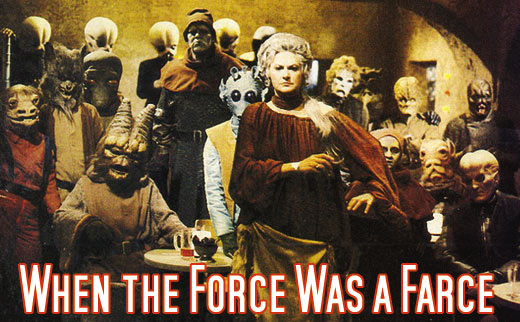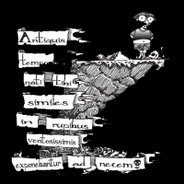I don’t know much about Star Trek, which is to say, I know plenty compared to some, and too much compared to many, but I’m posting on a site that has freakin’ pictures of Baltar laughing at Kevin Smith, so it’s not too much to assume that I may be out of my depth here, when writing about Star Trek.
But that’s okay, because I haven’t come here to tell you about Star Trek—I would never presume such a thing. I have come here to ask about Star Trek, and perhaps, in that, to be enlightened.
To begin, my last post was about the future, and how frustrated I was by the idea that I still have to work for a living. I mean, by this date in our popular speculative fiction, I should at most have to fly my suitcase car across town to oversee a single button for a few hours a day while the Jane XJ9 cleans the house.
In Star Trek, no one outside of Starfleet has to do even that much. There is no money, we are told, aside from pressed latinum, which I think we can all agree was introduced to give the Ferengi something to go all Dr. Smith over. Also to allow humans to look down on the Ferengi, as we’ve risen above such petty greed, thank you very much.
But seriously, what do non-Starfleet persons do in the Star Trek future? And not ONE WORD about how Picard’s brother runs a winery- I know he runs a winery, and that’s what one stuffy guy does with his free time, and doesn’t answer my question. After all, any nerd worth the dreaded Rear Admirals he suffered on the playground knows that the Judge Dredd comics predicted that 90% unemployment would mean incalculable crime rates. And no room for a winery, I’m sorry—it’s Mega-City 1, 2, Texas, the Sov Block or Cursed Earth, and that’s
it. The worst part about this is there’s no answer to the question, canonical, fanonical, or otherwise. It’s as if everyone on Earth is enlisted in Starfleet, and well, while that’s one possible future, it’s a bit grimmer than Star Trek is usually taken to be.
I’m tempted to say that the ‘no one has anything to do but everyone gets along’ ideal is the

biggest conceit of Star Trek—I mean, even Futurama didn’t go so far as to have ‘optional employment,’ and they had robots who run on booze and are far more fun to be around than any of you (except for that one who stabs people) – but I think the biggest problem with Star Trek is The Next Generation
in toto. Because not only does the series fail to examine the lives of those not in Starfleet, it glosses over the lives anyone not serving aboard the Enterprise, and those guys are probably having way more exciting adventures than the Enterprise is. Allow me to explain:
In Star Trek: The Next Generation, The Enterprise is the best ship in the fleet, with the most powerful shipboard computer. Captain Picard, who is so renowned that he has a combat maneuver named after him, leads it. His first in command, Commander Riker, has been offered his own command many times so he’s at least as good as most of the other Starfleet captains. The Enterprise also has the only android in Starfleet, who is incredibly smart, strong, durable and loyal. The have the only Klingon in Starfleet- an officer who can defeat the dreaded Borg with
a knife. They have a (hot) betazoid who can read minds. They have Geordie LeForge, whose visor makes him one of the most effective and efficient engineers in Starfleet. And before he turns into a space whale, they have Wesley Crusher, a boy genius so genius he saves the ship about 90 times when even these overachievers can’t manage it. Then he turns into a space whale. But I digress.
My point is, the crew of the Enterprise are so kick ass that they actually make trouble for themselves, as omnipotent space assholes such as Q pick on them almost exclusively. But Q aside, the entire series is based upon the notion that this ship—the best ship, the ship with the best captain and the most exceptional crew—can’t do a damn thing without encountering near-insurmountable obstacles, many of which would, if not overcome, have far-reaching effects and may even threaten the fabric of space and time
itself. Yet episode after episode the Enterprise only
just manages to squeak by. Seriously, the crew of the Enterprise only
just saves all of humanity almost as often as Gilligan and the other castaways only
just fail to get off the island.
So think about it—all the other ships in Starfleet are inferior to the Enterprise in every way, so they must have an even worse time of it. Those ships must be forever limping back into spaceport, hulls damaged from numerous collisions with other Starfleet vessels manned by crews as incompetent as themselves, having started a dozen wars with two dozen alien species, leaving countless sectors of space empty of life as they failed to stop a star from going nova, or from turning the borg back, and coming home only to find earth has been overrun by reptile-men because these inept crews couldn't figure out how to travel back in time and stop Harlan Ellison’s Star Trek the Motion Picture script from being made.
I think much of my bitterness about Star Trek comes from my frustration at my script for ‘Star Trek: The Previous Generation’ being overlooked in favor of ‘Enterprise.’ MY look at pre-Kirk Trek was awesome and would have easily run long enough to make it to syndication.
It’s a simple formula- take everything in the original Trek and back it off one generation. So: The tricorder becomes the dicorder. It weighs 40 pounds and runs of 80 D batteries. Women in Starfleet dress like the Solid Gold dancers. Phasers are pump-shotguns; stun setting is rocksalt rounds. The captain would be just like Kirk only worse- his mission is actually
to find strange new women and nail them. The prime directive would be just the same as it has been in naval forces for hundred of years: ‘Wear a rubber.’
I tell you, it would have been awesome.
--G
























